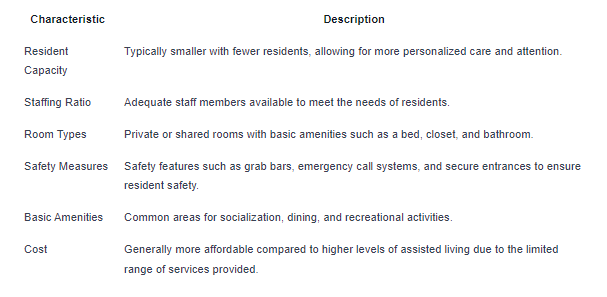Are There Different Levels of Assisted Living?
March 5, 2025
Unveiling different levels of assisted living: Discover basic, intermediate, and premium services for your loved ones' care.



Understanding Assisted Living
Assisted living is a type of residential care that provides support and assistance to individuals who may need help with daily activities. It is designed for individuals who value their independence but require some level of assistance to maintain their quality of life. Assisted living facilities offer a range of services and care options tailored to meet the unique needs of their residents.
Definition of Assisted Living
Assisted living can be defined as a type of housing arrangement that combines personalized assistance with healthcare services. It provides residents with a safe and secure living environment while promoting their autonomy and dignity. The level of care in assisted living can vary depending on the specific needs of the residents, ranging from basic assistance to more comprehensive support.
Importance of Different Levels of Care
Different levels of care in assisted living are essential to ensure that individuals receive the appropriate support based on their specific needs. Not everyone requires the same level of assistance, and having various care options allows residents to receive the care that best suits their individual circumstances.
By offering different levels of care, assisted living facilities can cater to a diverse range of needs, from individuals who require minimal assistance to those who need more comprehensive support. This flexibility allows residents to age in place comfortably, knowing that their changing needs will be met.
Having different levels of care also allows individuals to transition smoothly between levels as their needs evolve over time. For example, someone may initially enter an assisted living facility with basic care needs but may require a higher level of support as they age or their health condition changes. The availability of different levels of care within the same community makes it easier for individuals to receive the appropriate care without having to relocate.
Understanding the different levels of care in assisted living is crucial when considering options for yourself or a loved one. Evaluating the specific needs and preferences of the individual can help in selecting the level of care that will provide the right balance of independence and support.
Basic Assisted Living
When it comes to assisted living, there are different levels of care available to meet the specific needs of individuals. The first level we will explore is basic assisted living.
Services Offered in Basic Assisted Living
Basic assisted living facilities provide a range of services designed to assist residents with their daily activities while promoting independence. These services typically include:
- Assistance with personal care tasks such as bathing, dressing, and grooming.
- Medication management to ensure residents take their prescribed medications on time and in the correct dosage.
- Meal preparation and dining assistance to ensure residents receive proper nutrition.
- Housekeeping and laundry services to maintain a clean and comfortable living environment.
- 24-hour staff availability for emergency situations and general supervision.
- Social and recreational activities to promote engagement and socialization among residents.
Characteristics of Basic Assisted Living Facilities
Basic assisted living facilities are designed to provide a safe and supportive environment for individuals who require some assistance with their daily activities. Here are some common characteristics of basic assisted living facilities:

Basic assisted living is a suitable option for individuals who require assistance with daily tasks but do not have complex medical needs. It offers a supportive environment that promotes independence while ensuring residents receive the necessary care and support they need.
In the next sections, we will explore intermediate and premium assisted living, which provide additional levels of care and services for individuals with more complex needs.

Intermediate Assisted Living
Intermediate assisted living is a level of care that bridges the gap between basic assisted living and premium assisted living. It provides a higher level of support and assistance for individuals who require more help with their daily activities, but do not yet need the extensive services offered in premium assisted living facilities.
Services Offered in Intermediate Assisted Living
In intermediate assisted living, residents can expect a range of services that cater to their specific needs. These services may include:
- Assistance with activities of daily living (ADLs) such as bathing, dressing, grooming, and medication management.
- Meal preparation and dining assistance to ensure proper nutrition and hydration.
- Housekeeping and laundry services to maintain a clean and comfortable living environment.
- Transportation assistance for medical appointments and social outings.
- 24-hour staff availability to provide support and ensure the safety of residents.
- Social and recreational activities to promote engagement and socialization.
- Personalized care plans tailored to each resident's unique needs and preferences.
Characteristics of Intermediate Assisted Living Facilities
Intermediate assisted living facilities are designed to provide a supportive and nurturing environment for residents. Here are some common characteristics of these facilities:

Intermediate assisted living strikes a balance between providing the necessary support and independence for individuals who are not yet ready for the comprehensive services offered in premium assisted living. It offers a higher level of care and assistance, making it an ideal option for those who require more help with daily activities but still want to maintain a level of independence.
When considering intermediate assisted living for a loved one, it's important to evaluate their specific needs and preferences. Factors such as the level of assistance required, budget, location, and amenities offered should be taken into account to ensure the chosen facility aligns with their needs and enhances their overall quality of life.
Premium Assisted Living
When it comes to assisted living, there are different levels of care available to cater to the varying needs of seniors. Premium assisted living is the highest level of care offered in assisted living facilities, providing additional services and amenities to enhance the quality of life for residents.
Services Offered in Premium Assisted Living
Premium assisted living facilities offer a comprehensive range of services designed to meet the unique needs of residents. These services often go beyond the standard offerings found in basic or intermediate levels of care. Here are some common services provided in premium assisted living:
Services Offered
24/7 personalized care and assistance
Medication management
Assistance with activities of daily living (ADLs)
Regular health monitoring and wellness programs
Specialized memory care for individuals with dementia or Alzheimer's disease
On-site medical staff and nursing care
Gourmet dining experience with customized meal plans
Transportation services for medical appointments and social outings
Social and recreational activities to promote engagement and well-being
Access to fitness centers, spas, and other luxurious amenities
Housekeeping and laundry services
Concierge services for personalized assistance
Premium assisted living facilities strive to create a comfortable and upscale environment for residents, ensuring their needs are met with the utmost care and attention.
Characteristics of Premium Assisted Living Facilities
Premium assisted living facilities distinguish themselves by providing an enhanced living experience for residents. Here are some common characteristics of premium assisted living facilities:
Characteristics
Upscale and aesthetically pleasing living spaces
Spacious private or semi-private apartments with high-end furnishings
Resort-like amenities such as swimming pools, libraries, and theaters
Beautifully landscaped grounds and outdoor spaces for relaxation
Fine dining experiences with restaurant-style meals
The availability of specialized care for individuals with memory impairments
Access to a range of on-site medical services and therapies
Well-trained and compassionate staff members
Personalized care plans tailored to individual needs
Emphasis on promoting an active and engaging lifestyle
By offering an array of premium services and creating an environment that exudes luxury and comfort, premium assisted living facilities aim to provide seniors with a high-quality living experience.
Choosing the right level of assisted living for your loved one depends on their specific needs and preferences. Evaluating their care requirements, lifestyle preferences, and budget will help you determine whether premium assisted living is the most suitable option. It's important to tour different facilities, ask questions, and gather all the necessary information to make an informed decision that ensures the well-being and happiness of your loved one.

Choosing the Right Level of Assisted Living
When it comes to selecting the appropriate level of assisted living for a loved one, there are several factors to consider. Each level of care offers different services and accommodations tailored to varying needs. By evaluating these factors and understanding your loved one's requirements, you can make an informed decision about the most suitable level of care.
Factors to Consider When Selecting a Level of Care
- Medical Needs: Assess the medical needs of your loved one. Consider factors such as chronic conditions, medication management, and any specialized care or assistance required. Some levels of care may have limitations on the types of medical services they can provide.
- Mobility and Activities of Daily Living (ADLs): Evaluate your loved one's ability to perform activities of daily living independently. ADLs include tasks such as bathing, dressing, eating, and toileting. Determine if they require assistance or supervision in these areas and choose a level of care that can accommodate their specific needs.
- Safety and Security: Consider the level of safety and security required for your loved one. This includes factors such as emergency response systems, 24-hour staff availability, and the presence of security measures like alarms or surveillance systems. Ensure the chosen level of care provides a safe and secure environment.
- Social and Recreational Activities: Take into account your loved one's social and recreational preferences. Some levels of care offer a wide range of activities and amenities to promote social interaction and engagement. Consider the availability of group outings, fitness programs, hobby clubs, and other activities that align with your loved one's interests.
- Nutritional Needs: Assess your loved one's dietary requirements. Consider if they have any specific dietary restrictions, allergies, or preferences. Look for a level of care that offers well-balanced meals and the ability to accommodate individual dietary needs.
Evaluating Your Loved One's Needs
To determine the most appropriate level of care for your loved one, it's crucial to evaluate their specific needs. Consider the following aspects:

By carefully considering these factors and evaluating your loved one's needs, you can determine the right level of assisted living that will provide the necessary support, services, and amenities for their well-being and quality of life.
Sources
https://www.aplaceformom.com/caregiver-resources/articles/assisted-living-levels-of-care
https://seniorservicesofamerica.com/blog/are-there-different-levels-of-assisted-living/
https://www.arborcompany.com/blog/whats-the-difference-with-levels-of-care-in-assisted-living







































































































.jpeg)











































































































































































































.avif)























































.jpeg)

































































.jpeg)














.jpg)









































.jpeg)









































































.avif)




.avif)



























































































































































































































